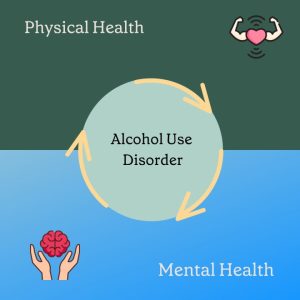Introduction:
Alcohol use disorder (AUD) is commonly understood as a physical condition due to the body’s dependence on alcohol and the manifestation of its symptoms. However, understanding alcohol use disorder as not just a physical but also a mental health condition, one influenced by psychological and societal factors, is vital to helping people improve their relationship with alcohol. Alcohol and mental health have a bidirectional relationship:
- AUD significantly affects mental health
- AUD may be a consequence of underlying mental health issues
Understanding this bidirectional relationship is essential for comprehensive treatment that addresses the root cause of someone’s drinking habit.
How Alcohol Contributes to Mental Health Issues
Short-term Effects on Emotions
Alcohol initially acts as a depressant on the central nervous system, leading to temporary feelings of relaxation or euphoria. However, as its effects wear off, irritability, sadness, and heightened anxiety often follow. This can result in emotional instability, poor decision-making, and strained relationships.
Long-term Mental Health Consequences
Chronic drinking can significantly worsen mental health, contributing to a range of conditions like depression and anxiety. Some of the long-term consequences include:
- Cognitive Impairment: Persistent drinking impairs memory, concentration, and decision-making, reducing overall cognitive function and making daily tasks more challenging.
- Increased Anxiety and Depression: While alcohol may offer short-term relief, it ultimately worsens symptoms of anxiety and depression due to changes in brain chemistry and neurotransmitter function.
- Emotional Dysregulation: Alcohol use affects the brain’s reward and impulse control centers, leading to mood swings and an inability to manage emotions effectively.
- Social Isolation: Alcohol dependence often leads to withdrawal from supportive relationships, exacerbating feelings of loneliness and self-doubt.
- Impaired Self-Esteem: The guilt and shame associated with drinking can erode self-esteem, leading to a negative self-image and loss of confidence.
These long-term mental health effects underscore the importance of understanding alcohol’s impact on mental health and seeking comprehensive support to address these challenges.
How Mental Health Issues Contribute to Unhealthy Drinking
Many people turn to alcohol to cope with stress, anxiety, or past trauma. Drinking is sometimes used as an escape from underlying mental health issues, such as:
- Stress and Burnout: High stress levels or burnout can push individuals to drink excessively as a way to relax or feel a temporary sense of control.
- Unresolved Trauma: Those who have experienced trauma may use alcohol to numb emotional pain or suppress intrusive memories.
- Anxiety and Social Pressures: Individuals with social anxiety may drink to feel more comfortable in social situations. However, this can result in dependence on alcohol to navigate social life.
- Depression and Loneliness: People struggling with depression or loneliness might use alcohol to lift their spirits temporarily, which can worsen depressive symptoms over time.
- Low Self-Esteem: Negative self-perceptions can lead people to drink to feel more confident or accepted, reinforcing a damaging cycle of dependence.
This reliance on alcohol as a coping mechanism often leads to a harmful cycle where drinking exacerbates existing mental health issues. Recognizing these patterns is crucial for breaking the cycle and seeking appropriate support, helping individuals address both the underlying emotional challenges and their relationship with alcohol.

Benefits of Recognizing the Dual Relationship Between Mental Health and Alcohol
Acknowledging the Two-way Influence
Understanding how mental health influences drinking and vice versa allows for more effective treatment plans that address the root causes of alcohol use disorder.
Integrated Treatment for Better Outcomes
A treatment plan that considers an individual’s complete mental health history can lead to better outcomes by promoting healthier coping mechanisms, reducing the risk of relapse, and aiding in building a supportive lifestyle.
Tips for Improving Mental Health While Changing Your Drinking Habits
Building Healthy Coping Skills
Develop coping mechanisms like meditation, creative hobbies, and exercise to handle stress without alcohol. These strategies offer positive alternatives for emotional regulation.
- Check out some of our favorite sober activities
- Or some of our favorite books for those in recovery
Seeking Professional Support
Alcohol therapy is proven to be an effective treatment option for meaningfully reducing your alcohol consumption on your sobriety or moderation journey Monument has therapists or doctors who can offer personalized guidance and evidence-based therapies, such as cognitive-behavioral therapy (CBT) or motivational interviewing.
Cognitive Behavioral Therapy helps you:
– Build coping skills without alcohol
– Manage cravings and urges to drink
– Manage negative thoughts and feelings
– Persevere through setbacks
– Address co-occuring anxiety and/or depression
And Motivational Interviewing helps you:
– Identify goals and aspirations
– Build supportive and healthy relationships
– Cultivate your inner motivation
– Develop a commitment to your goals
– Create an action plan to achieve them
Monument accepts almost all major health insurance and all treatment happens from the comfort of your home.
Finding Peer Support Groups
Join supportive networks like those on the Monument platform to build accountability, share experiences, and find encouragement. Monument’s community hosts moderated support groups where you can meet and talk with peers.
Disclaimer:
Our articles and resources do not constitute clinical or licensed therapy or other healthcare services. If this is a medical emergency, call 911.
Resources:
- https://www.ncbi.nlm.nih.gov/pmc/articles/PMC6826822/
- https://www.mentalhealth.org.uk/explore-mental-health/a-z-topics/alcohol-and-mental-health#:~:text=Alcohol%20affects%20the%20part%20of,anxiety%2C%20regardless%20of%20your%20mood.
- https://americanaddictioncenters.org/alcohol/risks-effects-dangers/mental
- https://www.webmd.com/mental-health/addiction/what-to-know-about-alcohol-and-mental-health
- https://youtu.be/9e3HzdhW_hg?feature=shared